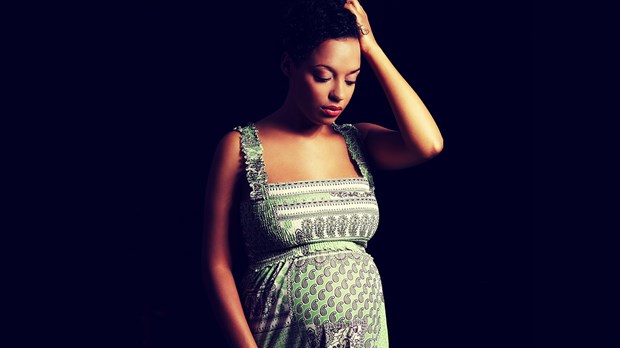When the Curse of Childbearing Hits Home

What comes to mind when you hear the words birth story?
It could be that your only experience with childbirth is from binge-watching episodes of A Baby Story. Or maybe, you’ve birthed four children and look back fondly on your experiences.
However, your life may also tell a different story. Maybe you have had a traumatic birth experience that’s left you terrified to try again. Maybe you long for a baby, and your heart aches every time your friends swap delivery room recounts.
For every woman who’s had an easy pregnancy and a positive birth experience, there’s another woman’s story lurking in the shadows—one filled with sorrow, pain, and fear.
The Curse Runs Deep
Often, we only joke about the curse of pain in childbearing when our period rolls around or when the contractions start. But to understand the depth of our pain in childbearing, we have to rewind much farther than the delivery room or monthly calendar. When Adam and Eve sinned, they were individually cursed. Eve bore the curse in childbearing—God said he would “sharpen the pain” of her pregnancies (Genesis 3:16).
Throughout the Bible, we are confronted again and again with the hard blow of this curse. Rachel died giving birth to her second son, after years of infertility (Genesis 35:16–20). The woman with the discharge of blood desperately clung to Jesus for relief (Mark 5:24–29). Hannah exhausted herself pleading with God for a baby (1 Samuel 1:1–20). And while it is not mentioned explicitly, it can be inferred that even Ruth was barren at one point. There is nothing easy about bringing children into this fallen, broken world—and yet through it all, God promised he would redeem the world through a baby born to a woman—the promised seed.
The Curse Hits Home
For all the current discussion about the pros and cons of natural childbirth, the phrase that continues to come up is that “God designed women’s bodies for birthing babies. Birth is natural, not scary.”
I wonder if the women of old would see it that way. Just 100 years ago, 600 women in every 100,000 died in childbirth. It was twice that in the 1600s and 1700s. Many families buried their children in infancy or childhood. For them, birth and raising children was a frightening reality. Today, many women still feel this way.
Some get pregnant easily, the pregnancy progresses with no real problems besides the typical discomfort, and the delivery goes according to plan. For many women, the journey to holding their precious baby in their arms is a joy-filled one. The pain of labor suddenly seems like a distant memory when they see the sweet face of their babies for the first time. Even in the curse, God gives us treasures of his redemptive goodness.
But for others, this is hardly the case. For myself, I have felt the sting of the curse acutely. I have had two miscarriages (one very complicated and the other fairly “normal”), two years of infertility and treatments, two surgeries, a complicated twin pregnancy, and with my newest baby, an emergency cesarean section. Going into the birth of my twin boys, I knew that it would not be easy or normal. I was sent to the hospital eight weeks early to deliver them unexpectedly because one twin had stopped growing. After the delivery we realized how serious the situation was, and that my son could have died. We spent five long weeks apart from them as they continued to grow and develop in the NICU, only to be met with eight months of physical therapy for the son who failed to thrive in my womb.
In my darkest moments of that first year of their life, I felt self-pity and despair creep up inside me. “How could God do this to me?” I would rail. “Haven’t I endured enough with miscarriages, infertility, and the NICU?”
I thought I deserved a break from the difficulties of life for a while. I simply wanted the “normal” experience with my babies, one that didn’t include finding babysitters for my healthy son and twice weekly trips to physical therapy.
The truth is, living in a fallen world means the ravages of sin are all around us, ready to devour our very souls. It’s easy to look at the perfectly crafted nursery photos and pictures of pristine hospital rooms post-delivery and think that we who have struggled with pregnancy and birth have missed the mark, or worse, that our path to motherhood was somehow subpar. But in the aftermath of the Fall, even the best pregnancy, birth, and parenting experiences pale in comparison to God’s original design. We will all one day be disappointed with the story placed in front of us, whether it is our birth story, our inability to conceive, or the tantrum that is happening for the fifteenth time today.
When Adam and Eve fell, the very thing that God created to bring them the greatest joy in their role as image bearers fell sharply under the curse of sin.
Hope After Genesis 3
But there is hope, isn’t there? The promised seed did come in the exact way God said he would. God came to earth to redeem us from the curse through the very process that he himself proclaimed a curse over. It was almost as if he was showing us that all is not lost in our painful birth stories, or in the excruciating pain that motherhood so often brings. But his birth didn’t come without disappointment and consequence either.
Mary had to suffer to bring the Christ into the world. The young virgin forever faced the curse of an illegitimate pregnancy. She delivered her baby boy in a barn with only her husband by her side, laboring in the midst of animals and the smell of manure. And 33 years later, Mary watched her precious son be slaughtered for her sins—and for ours.
Where do we go with our disappointing, traumatic, and suffering-filled experiences of childbearing? To the same Christ who experienced the curse in every way for us in order to redeem those of us who are under the curse of sin (Galatians 3:13). When the curse of childbearing hits home, no matter the depth of our despair, we can know that God bore that very curse for us. It’s no longer our burden to bear. While we may experience it in the rawest of forms, it’s not the final story in our life.
We have something on this side of the Cross that our Old Testament sisters only knew dimly. In every pain that came with bearing their children, they clung to the hope that one day the promised seed would finally redeem what was lost that fateful day in Eden. As Christian women, living between two worlds, we get a small glimpse of that hope in the form of Christ, who is acquainted with sorrow, grief, and pain (Isaiah 53:3). But we’re still longing for that final redemption. For every disappointing or traumatic childbearing experience, we tell the story that all is not right in this broken world. We cry out with our broken bodies, longing for that final redemption, when all will be well. Until then, we say, “Come, Lord Jesus.”
Courtney Reissig is a pastor’s wife, blogger, teacher, regular contributor for Her.meneutics, and the author of The Accidental Feminist: Restoring Our Delight in God’s Good Design. You can read more of her writing on her blog or follow her on Twitter at @courtneyreissig.
Read more articles that highlight writing by Christian women at ChristianityToday.com/Women
 Read These Next
Read These Next

 How to Live a Full—Not Frantic—LifeLysa TerKeurst shares how you can stop being stressed, stretched, and pulled beyond reasonable limits.
How to Live a Full—Not Frantic—LifeLysa TerKeurst shares how you can stop being stressed, stretched, and pulled beyond reasonable limits. Feeling a Victim's PainWhen her daughter was murdered and another daughter attacked and left for dead, Lorraine Whoberry fought for answers but was ignored. Now she fights on behalf of victims' families everywhere.
Feeling a Victim's PainWhen her daughter was murdered and another daughter attacked and left for dead, Lorraine Whoberry fought for answers but was ignored. Now she fights on behalf of victims' families everywhere.
 Finding a Great Husband Doesn't Just "Happen"5 things I wish my mom had told me about dating and preparing for marriage
Finding a Great Husband Doesn't Just "Happen"5 things I wish my mom had told me about dating and preparing for marriage








 Homepage
Homepage